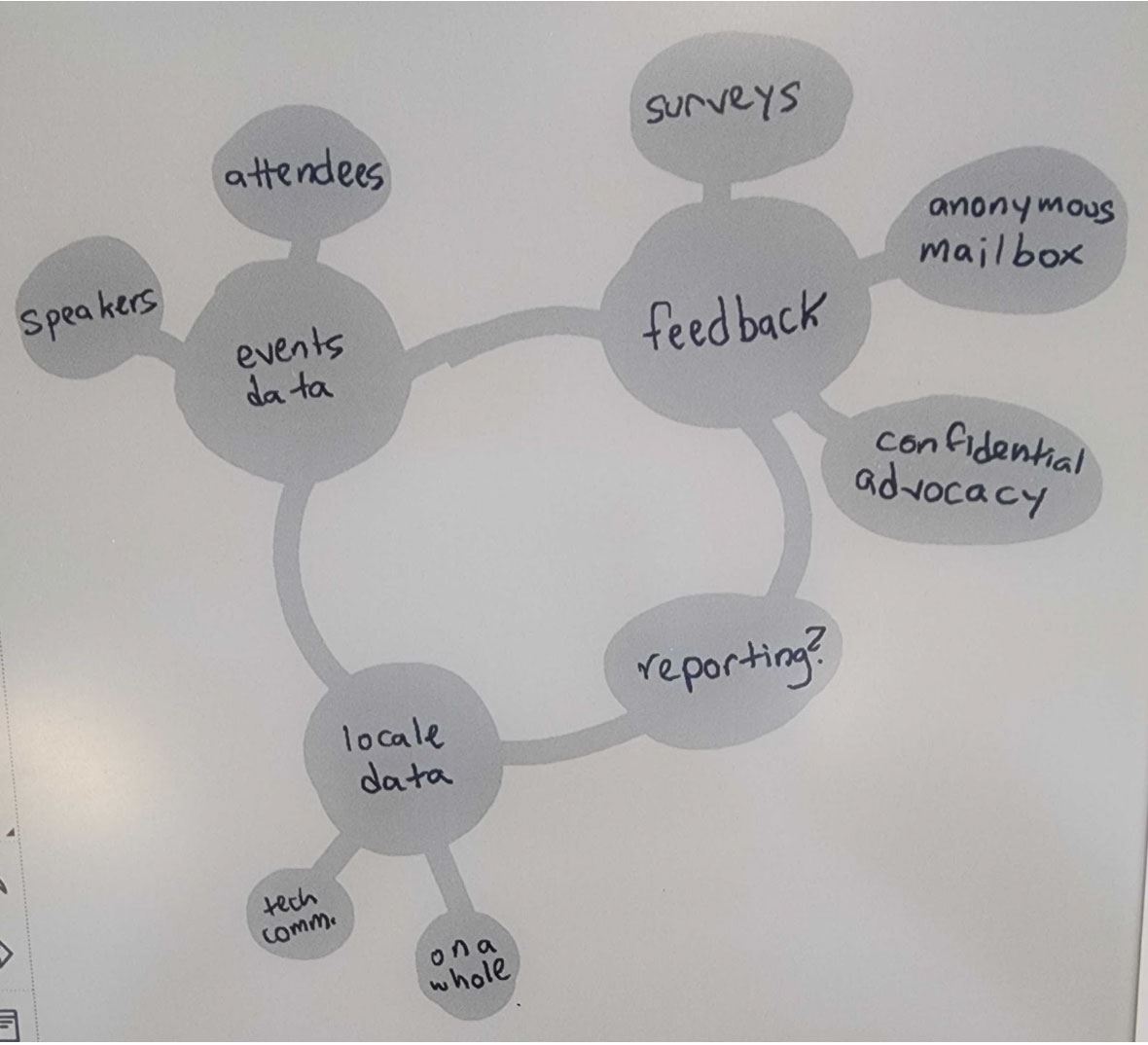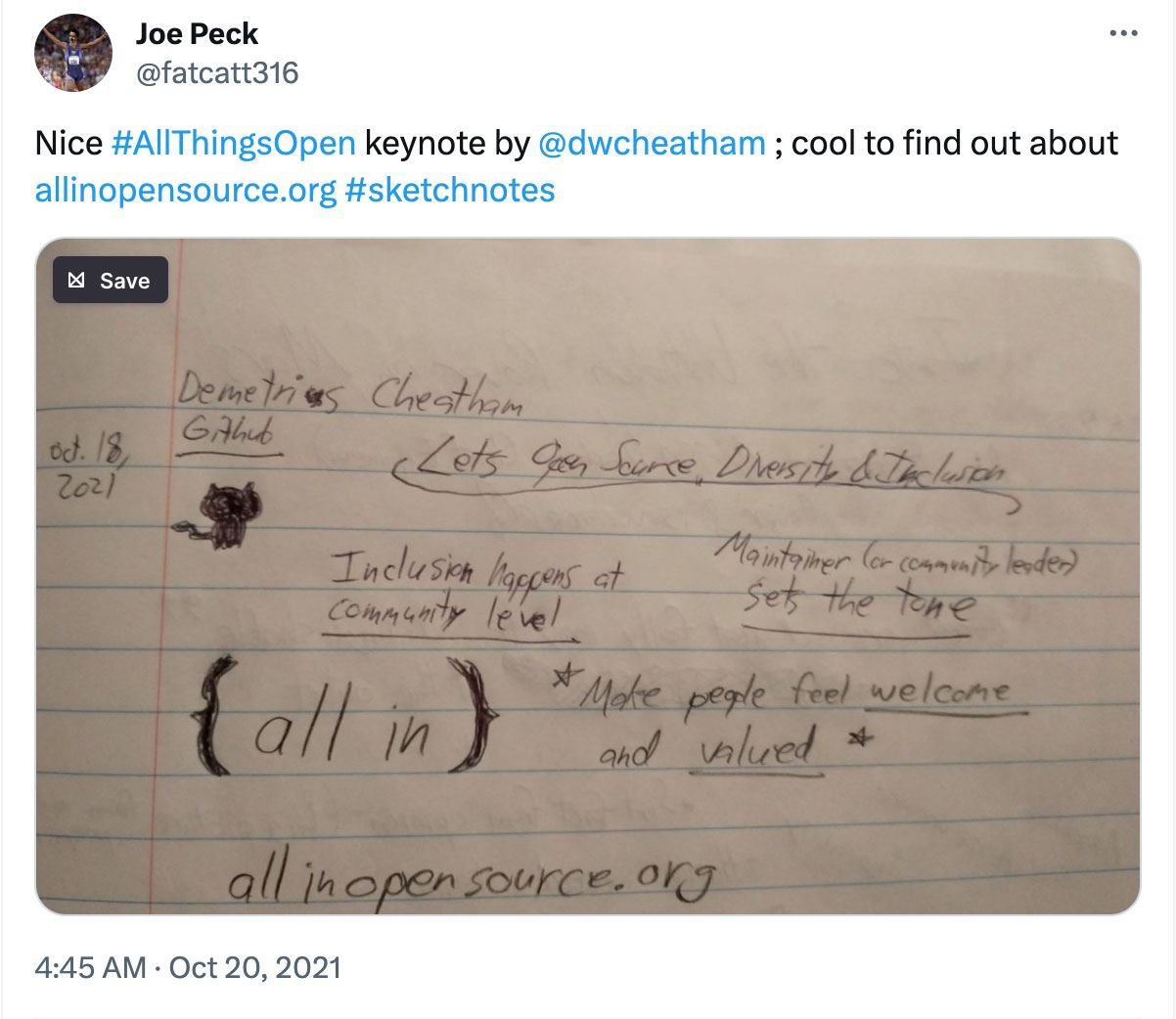It's been three months since the Community Teams meetup in Odense, but a number of topics mentioned during and around then have been hanging around. And by hanging around, I mean quite literally, sitting in a number of the 98 tabs open on my mobile device, or in drafts and notes --things meant to be read more thoroughly when time allows, like DEI reports, articles about Community Smells, Pillars of Inclusivity, etc.
Teams Visit Revisited
There's certainly a lot of overlap between our DEI efforts and understanding, and those of other communities (whether open source or not).
During this year's teams meeting we found ourselves reviewing events policy, feedback needs, equity challenges, and trying to confirm what communities we wanted to intentionally sponsor/raise up – and how. The "how" question is the most researchable and actionable, and in my mind it looked like a multi pronged approach could help to promote feedback loops for this "how":
- Events data, including speaker and attendee information
- Locale data (information about the location for in-person events to understand the makeup of the people there, on a tech community and on a whole)
- Reporting/other notifications from community leader(s) and/or HQ, to help initiate feedback loops and discussion
- Feedback ports, like surveys, anonymous mailboxes, and confidential advocacy (big thanks to Jason Wodicka for mentioning how this can work)
- Missing from this diagram: education, learning (what can we glean from others in tech, Open Source, or other industries? What information can we pass along to learn more about DEI?)

A diagram from the Sept 2023 Community Teams visit, illustrating data and feedback actions that could help with DEI efforts
Of course – a diagram drawn in a weekend isn't necessarily actionable. Folks more familiar with GDPR than my American self know that there's complexity involved with receiving and storing PII of any sort, which can chop off ¾ of the above diagram. Cultural differences between countries (and even states, if we're talking USA) can also mean huge differences between survey responses and feedback from our communities, who may want specific DEI efforts, or may not agree with prioritization of specific actions. This all makes sense pragmatically. As software developers we know there are many avenues to a follow in any project context, and different project managers might prioritize different tasks depending on their background, management style, and so on. As a global community, understanding that different members from different backgrounds want different DEI initiatives prioritized or emphasized makes absolute sense (though it does mean a good deal of complexity added).
Manageable Complexity through Open Source?
We're certainly not the first people to ask "how" we can prioritize DEI efforts, or "what" actions should be common sense amongst community maintainers. Prior to the Community Teams visit, Sebastian had forwarded a link to All In, and somewhere during the visit I'd also found CHAOSS (Community Health Analytics in Open Source Software), more specifically their recommendations towards event runners for DEI efforts. Lo and behold, these two are linked – All In provides actionable and open sourced ways to advance diversity and inclusion in communities, and one of such actions includes event badging for DEI efforts, which comes from CHAOSS itself.
I won't reiterate everything from the All In and Chaoss resources but there are a number of questions that their processes (or reaching out to an All In member) can help answer, like "how can we collect event data to track our DEI efforts?" – here's an example of a badged event and the application required to indicate commitment; given that this is an in-person event in Europe, PII considerations must have been taken. And "What kinds of questions and expectations do other open source communities have around DEI and becoming a more inclusive community?" (For those that hate clicking on links, All In conducted a research gathering phase amongst open source communities to discover pain points, expectations, and shared understanding about DEI initiatives)
It's both reassuring and exciting to see events like Dotnet Conf, State of OpenConf, KubeCon, GitOpsCon, gRPC Conf and more showing commitment and emphasizing that actions towards becoming a more diverse, equitable, and inclusive community are important in all these spaces – and I think there's a number of great ideas and practices we can learn from open-sourced DEI.
Manageable Complexity through Open Source?
Based on the Umbraco community's known emphasis on being friendly and inclusive, I know that celebrating all Umbracians and encouraging them to grow and flourish is common sense.

Here's a set of notes from and All In talk at All Things Open 2021, where Joe Peck notes that yes, inclusion happens at the community level, but the maintainers and community leaders set the tone. We all, as this image says, want to "make people feel welcomed and valued" – the common sense from All In is something I think worth going "all in" on. (Yes, I'm ending with a poker pun because I've been watching reruns of World Poker Tour, but also it's a very clever name.) I'm interested to hear from folks in the community– what are great takeaways from these initiatives? What were DEI initiatives or postive changes from 2023 worth celebrating? And what kind of distinctly inclusive, "Umbraco for Everyone" energy do we want to bring with us into 2024?!
Written by: Alice Meng
Published: December 21st, 2023